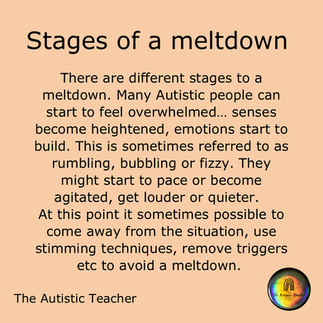
Autistic Meltdowns: Understanding and Managing Them
- mandycook2021
- Dec 22, 2023
- 2 min read
I am Autistic. I have Autistic children. Attempting to take them out, especially when they were younger, was always a challenge. When it all gets too much for them, they might just ‘explode’ - shout, scream, hit out, run away, hide… it can look like bad behaviour. Very often, we, the parents, will be judged with ‘looks’, tuts or unkind comments. It is important to note that autistic adults can have meltdowns too! For me, I might burst into tears. Or I might get a bit louder, or quieter and walk away.
What Meltdowns Can Look Like
A meltdown is a response to an overwhelming environment or situation that results in the Autistic person temporarily losing control. It is NOT a tantrum. It is the result of being completely overwhelmed. Every sense can become heightened and it can all become too much. It can result in crying, screaming, shouting, becoming non speaking, kicking, or lashing out.
What Triggers Meltdowns
Every Autistic person is different and will have different ‘triggers.’ These are just a few:
Sensory overload (Too much noise, too bright etc)
Unable to regulate temperature
Too many people
Physical pain
Too many demands
Frustration
Feeling misunderstood or unheard
Not being able to communicate
Unfamiliar places
Masking for too long
Extreme emotions
Not being able to identify emotions
Exhaustion
Making mistakes
Changes to routine
Stages of a Meltdown
There are different stages to a meltdown. Many Autistic people can start to feel overwhelmed… senses become heightened, emotions start to build. This is sometimes referred to as rumbling, bubbling or fizzy. They might start to pace or become agitated, get louder or quieter. At this point, it sometimes possible to come away from the situation, use stimming techniques, remove triggers etc to avoid a meltdown.
During The Meltdown
If someone is having a meltdown please don’t judge. Understanding can make a huge difference to an Autistic person or their carers. Give them time. It can take a long time to recover from a meltdown and it is absolutely exhausting. Stay calm and don’t make any demands. Try to find a quiet place for them to recover without people staring or asking questions.
Identifying and Reducing The Causes
The best thing to do is identify factors that have caused the meltdown- this is often easier said than done! Even for myself, it can take a while to unpick and is usually a number of different things that have built into something that has become overwhelming. Try noting down things that might have caused it or create a diary with time and place to see if there is a pattern that would help you identify the potential causes.
By identifying the causes you are then able to reduce the things that might cause a person to feel overwhelmed. Every Autistic person is different but it can often be sensory differences, changes to routine, anxiety and communicative and sometimes combinations. For me, I can struggle in situations with lots of people (perhaps linked to face blindness) and anxiety around communication. Knowing this helps me to prepare and regulate better.
How to Support
If you have enjoyed my work and would like to support my mission to help the Autistic Community, feel free to buy me a coffee. Please only donate if you can afford to do so. Everything given is very much appreciated. ❤️ You can also help to spread the word by liking, loving and sharing my posts. ☺️

























Comments